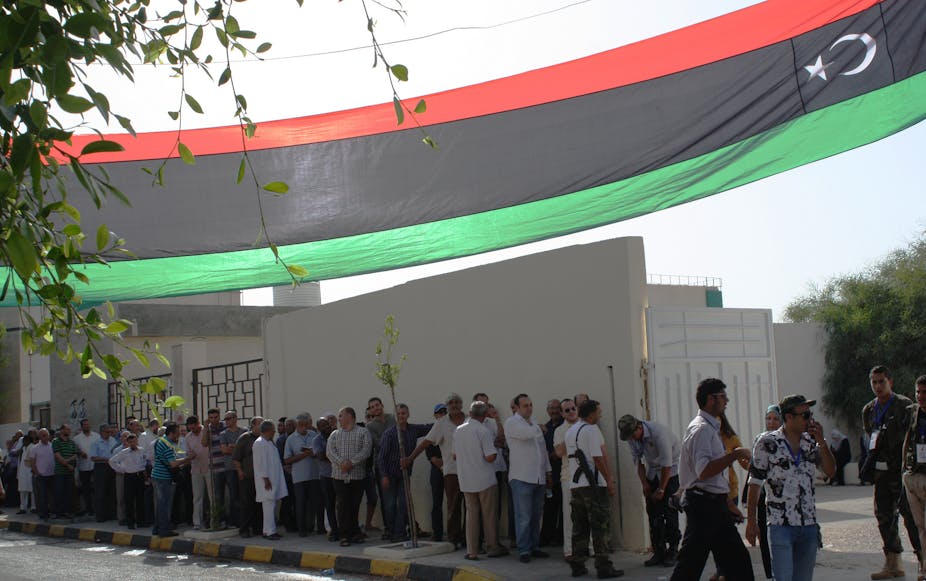Libya has been politically unstable since 2011 when a successful uprising against Muammar Gaddafi’s longstanding regime left a power vacuum. A transitional government was elected in 2012; it quickly became dysfunctional. To replace it, the North African country held an election in 2014 but this led to the creation of rival governments, each backed by a powerful coalition of militias.
One government was based in Tripoli dominated by Islamists and hardline revolutionaries, in the west. The other was a parliament in the east, headed by Aguila Saleh, and supported by the so-called Libyan National Army which is led by General Khalifa Haftar.
A state of open civil war ensued and, taking advantage of the situation, the Islamic State established a strong foothold in the country.
In 2015, UN efforts to reconcile the two parliaments led to the creation of another interim administration: the Government of National Accord, headed by Fayez Serraj. But these efforts took a backseat as Libya’s factions worked with foreign governments to confront the Islamic State and address the Mediterranean migration crisis.
The peace process seemed to be going nowhere. Then, in the last week of May French President Emmanuel Macron hosted an international conference on Libya. It was the first time Libya’s political and military leaders were brought together. The outcome was a statement which promised to hold elections for a new parliament and president by the end of 2018.
However, serious questions remain as to whether another interim government will solve the country’s political crisis.
Libya’s transitional leaders, some of whom will be presidential candidates, are entangled in – and benefit from – the country’s war economy. So do various armed factions that may view the vote as a threat to their interests and disrupt the process before it begins.
There are also a number of peace processes being simultaneously rolled out, which confuses the way forward. And there are new security risks and still no constitution, which undermines the legitimacy of institutions that many still view as interim and temporary.
War economy
The war economy is the main factor working against political reconciliation. It developed in the years after Gaddafi’s regime collapsed and is driven by the hundreds of self-armed militias that emerged after plundering his vast armouries.
Some of these groups are formally recognised by national authorities and foreign governments. Others act informally or as local security for towns, tribes, or ethnic groups. To support themselves, they fuse together; public forms of financing like state sector salaries, smuggling (notably, oil), human trafficking, kidnapping, extortion and “protection” rackets. These groups hold both the civilian population and the country’s core infrastructures – like oil, electricity and water – hostage.
This economy poses a grave threat to human security and implicates the very figures that were at the peace talks last week. That includes Serraj, Saleh, Haftar, and Khaled Al-Mishri of the Muslim Brotherhood.
Serraj, Libya’s internationally appointed head of state, was only able to take up residence in Tripoli by making alliances with the very militias that started the civil war in 2014.
Saleh, who heads the internationally recognised parliament, owes much to the alliance with General Haftar’s Libyan National Army, a rival coalition of militias. There are concerns that Haftar will be a leading presidential candidate and his vociferous supporters may refuse to recognise any outcome they don’t like.
Al-Mishri is also chair of the High Council of State, a consultative body working with Serraj’s administration. This council draws its strength from Islamist militias in the west of the country and supports those fighting Haftar in the east.
All of this raises serious concerns around the elections. It’s not just a matter of who wins the vote: whose militias will become legitimate and whose will not? More importantly, will the winners of the vote have enough political power to subordinate Libya’s new security forces to civilian governance and provide realistic alternatives to the highly lucrative war economy?
Challenges
But overcoming Libya’s crisis also goes beyond creating an effective national government.
Firstly, there are multiple peace processes being simultaneously rolled out. These include Libyan only talks, talks sponsored by neighbouring states like Algeria, Tunisia and Egypt, and talks led by the North Atlantic powers who aided the 2011 rebellion. Having so many processes allows factions to pick and choose which one they like and which they want to boycott.
Since his appointment last June, UN envoy Ghassan Salamé has tried to centralise the process by issuing his own roadmap. This proposed amending the 2015 Libyan Political Agreement, convening a “national dialogue,” finalising the constitution, and holding elections for a parliament and a president – all by the end of 2018.
However, the new roadmap Macron signed in Paris has added to the confusion. It’s not clear whether France or the UN is leading the process. Given the fact that France has rendered military assistance to Haftar’s forces, a peace process led by the UN would help allay fears that the West is seeking to impose itself on certain factions.
Another major challenge is that, almost seven years after Gaddafi’s fall, there is still no constitution. The finalisation and adoption of a constitution has been deferred because various constituencies can’t agree on several issues. These include the role of religion in politics, civil military relations, and the participation of officials from the old regime. Without a constitution, Libya’s various factions view the country’s political future as still up for grabs.
Finally, there are armed spoilers who go to great lengths to prevent elections, either for ideological reasons (like the Islamic State) or to prevent their rivals from taking power. One example of this is a recent suicide attack on Libya’s electoral commission headquarters in Tripoli.
Unless the new roadmap addresses all of these challenges, the new election, and any subsequent interim government it ushers in, will be set up to fail.

